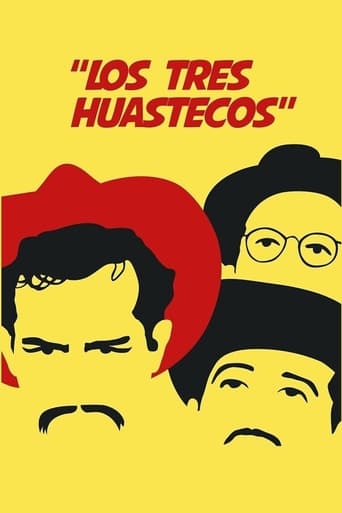MartinHafer
"Los Tres Huastecos" is an old fashioned comedy/musical/adventure film. In many ways, it's similar to the Hollywood musicals of the period and is a good introduction to Mexican cinema for non- Mexicans.The story begins with a prologue. You learn that there were three identical brothers who were sent to live in three different homes when they were orphaned. Because they grew up apart, the boys followed very different paths. One became a conservative priest, one a roguish policeman and the other a disreputable sort who people think might be a murderous bandit. When the film then begins, the policeman has been sent to capture the bandit, the priest has been assigned to a new parish and the third brother happens to live in this same town. What's next? See the film.What I loved about this film is the great cinematography. While today we take camera tricks for granted since they are so much easier to do in this computer age, back then you needed an extremely talented cameraman and an equally talented director to make a film with one actor playing three different parts--which Pedro Infante does here. Yet, amazingly, this is done seamlessly--even in scenes with two or three of the brothers! And, of course, Infante must be praised for doing a wonderful job with such different characters.As for the movie itself, it's fun but also a bit dated. In particular, the music is a bit poor--with a real canned sound to it. I've noticed this in many musicals from abroad, as getting the sound right in musicals is something Americans take for granted, as after about 1932, the Hollywood musicals achieved this. But, here it just sounds like someone is playing a record or singing in a tiny room-- and it sounds odd. But this really doesn't take away from the rest of the film that much--it still is fun and quite enjoyable to watch.
hawparks
Undoubtly this is one of the most beloved Mexican movies from the late 40's. Which was the most prodigal years of the Mexican Cinema in quantity and in quality. I feel proud when I see young people giving a chance to an old b/w movie (not only from Mexico or Hollywood), and end up enjoying it and asking for more. And this one in particular never fails. The cast is incredible; just imagine 3 Pedro Infantes with a different personality each, his favorite leading lady Blanca Estela Pavon who died a few years after, Mantequilla as funny as usual, and perhaps the one that steals the show, the irresistible little brat Tucita who has tarantulas and snakes for pets. And if this is not enough, you don't have to be Mexican to enjoy the great huapango music from La Huasteca. All this makes it a colorful movie, only in b/w. A great entertaining film that just must be digitally restored and preserved.
valdezlopez
When watching Los tres huastecos I'm happy to say that its magic has endured since 1948.Directed by Ismael Rodríguez and starring Pedro Infate (three times I might add) it was bound to call attention from the start.Nonetheless, it has been throughout more than 50 years a great example of good cinema (Mexican or not): filled with songs, laughter, a good villain, witty dialog and main actors exhuding charisma (Pedro Infante, once again, multiplied by three, Blanca Estela Pavón, and Mantequilla -Cuco-, not forgetting the unforgettable first appearance by María Eugenia Llamas, a.k.a. La Tusita).The nostalgia of a Mexico that probably is no more is thrown into oblivion once the plot starts. The whole story evokes a simpler, warmer México. It's important to note that this is one of many, many movies that were done back in the Golden Years of Mexican cinema, that shared this kind of quality and vibrancy.Long gone are the days when Pedro made a movie and it was worth seeing, when watching a Mexican movie would put a smile on your face, or draw a tear from your eye. Nowadays few -and I mean quite a FEW... near to NONE- Mexican productions rival this kind of storytelling, regardless the genre, plot, size or people involved.



